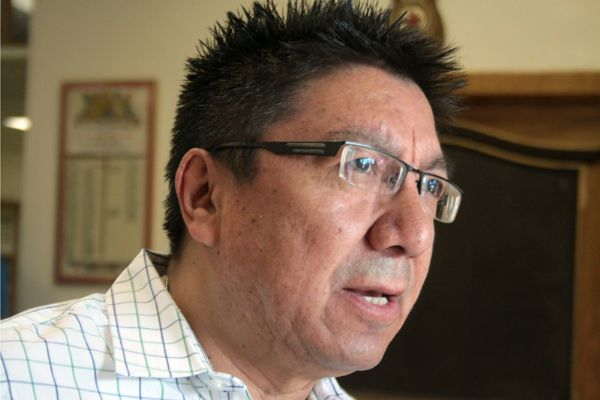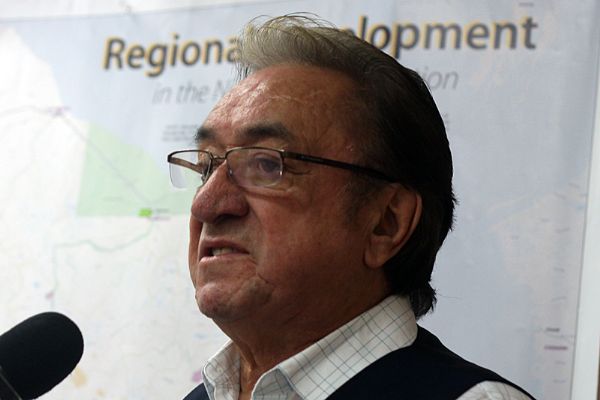Candidates for Nishnawbe-Aski Nation Grand Chief are in the final stretch before heading to Aroland First Nation for elections on Wednesday.
Incumbent Grand Chief, Harvey Yesno is taking on both his deputies for NAN's top position, which will lead the organization representing 49 Treaty 9 and 5 First Nations in the Far North.
Although Yesno did not respond to media requests, Alvin Fiddler and Les Louttit have very different visions for the relationships First Nations would have with NAN under their leadership and what kind of relationship NAN ought to have with the provincial and federal governments.
Alvin Fiddler

In his position as deputy grand chief, Muskrat Dam First Nation-born Fiddler handled Health and Justice portfolios as well as Women and Youth Development. He's best known for his work contributing to the Ipperwash, Goudge and Goodwin & Wesley inquiries.
He also played a pivotal role in the advocacy that led to both the Iacobucci Review and the inquest into the deaths of seven NAN youth who died while attending high school in Thunder Bay.
Fiddler believes the organization needs to re-connect with the people it represents, saying NAN has agreed to infrastructure and energy projects in the past without the knowledge of impacted communities.
"There's a growing sense of disconnect between NAN and the tribal councils we work with, right down to the community level," Fiddler said, putting emphasis on engaging youth and promoting communication technology.
"Whatever's going to be happening, they need to feel they're a part of it."
On intergovernmental relations, Fiddler would take aim at Ontario's Far North Act, if he's elected. Under the act, First Nations are considered applicants like any other development proponent and Fiddler said communities currently need to make applications for cutting down a tree or digging a hole. He called it a disrespect to the intent of the treaties and under his leadership, NAN would take a localized approach.
"We'll be considering options on how we address that but what our communities are considering more and more is moving away from or disregarding the Far North Act and just asserting their rights and jurisdiction to the land and the resources on the land," he said.
"We'll no longer apply, we'll no longer seek the permission of any minister of any government to do whatever we need to do to develop our economies in our communities. The old way of doing business isn't working well for our people. It's not working well for our communities and if the government is serious about working with us in these areas, they'll have to change the way they do business as well."
Les Louttit

Born on the coast of James Bay in Fort Albany First Nation, Louttit is one of the original employees of Grand Council Treaty 9, rising to executive director through directing community development, local government and housing in the 1970s and 1980s.
Over his two terms as deputy grand chief, he has overseen Housing, Lands & Resources, Treaty Research & Claims, Infrastructure and Resource & Economic Development, including the Ring of Fire.
As grand chief, Louttit would establish a treasury, which would operate like a national bank to lead regional development. He would then use NAN's 2012 resolutions as a framework to pursue resource revenue sharing agreements with the Treaty 9 partners in the provincial and federal governments.
"The province is willing to have those discussions, hopefully leading to negotiations for a NAN-wide, resource-based revenue sharing agreement. When we have that, we can take a portion of those resources into a treasury, which would benefit all NAN First Nations," he said.
"When we signed the treaty, from our treaty history, it was the intent of our elders that we would share the land 50/50 with the developers of the province. We have not received our fair share of the wealth extraction for our lands and resources."
NAN signed an agreement on governance in principle with the federal government but it didn't proceed to a final agreement. Louttit suggested that agreement would have included some kind of fund to make First Nations participants and that would have sparked NAN-wide negotiations on a new governance structure. He said that kind of reorganization is necessary for member First Nations to succeed in taking the reins on their own economies.
"Of course we need to develop an economy but to do that, we have to create jobs, provide training for our youth in skilled trades, take advantages of employment opportunities in the resource sector like mining, forestry, tourism, etc. We need to do that to create these regional economies."